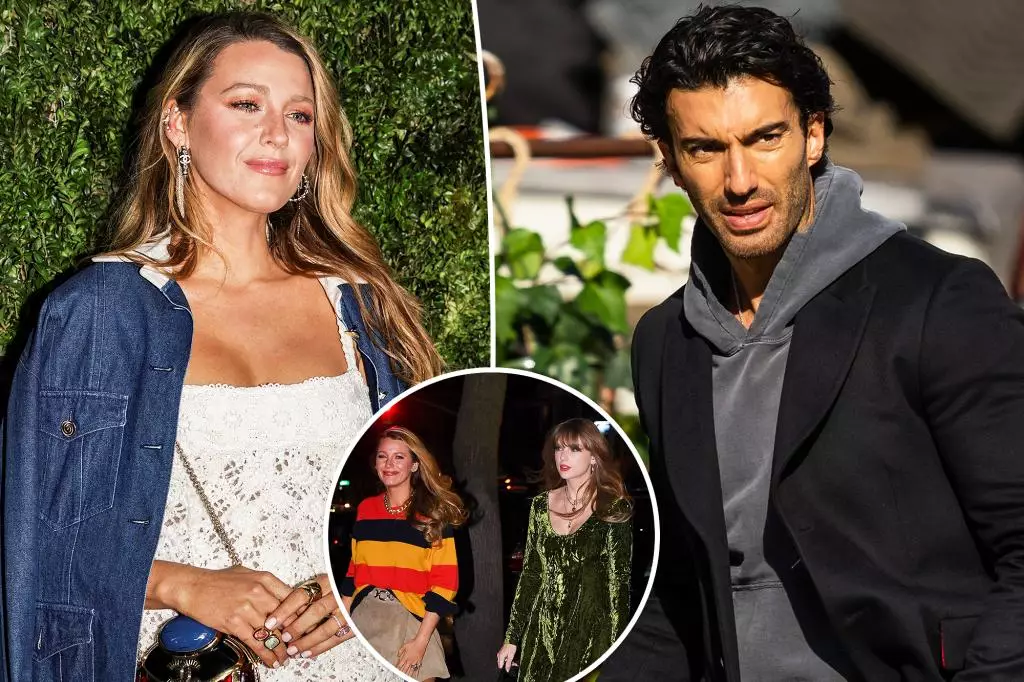In the glamorous world of Hollywood, where public personas often overshadow private lives, the legal clash between Blake Lively and Justin Baldoni has taken on a life of its own, marked by claims, counterclaims, and the unexpected inclusion of pop sensation Taylor Swift. The recent legal maneuvers, particularly Lively’s motion for a protective order regarding the access to her private conversations with Swift, spotlight a broader trend where personal relationships become collateral damage in high-stakes disputes.
This tactic of dragging in high-profile individuals by way of legal strategy is both intriguing and concerning. Notably, Lively’s position emphasizes that her communications with Swift are neither central to the disputes at hand nor relevant to Baldoni’s claims against her. This raises the question: to what extent should personal relationships and communications be fair game in the courtroom? In this case, Lively clearly views the pursuit of such communications as an invasion of privacy but more pointedly, as a cynical move by Baldoni and his team to bolster their public relations at her expense.
The Media’s Role in Legal Battles
The interplay between the media and ongoing legal disputes has become a double-edged sword. On one hand, media coverage can significantly shape the narrative surrounding the parties involved; on the other, it can amplify the use of tactics that exploit public admiration for figures like Swift. Lively’s legal documents allege that Baldoni’s team has employed Swift’s name as a part of a broader media strategy. This raises ethical considerations about the extent to which the fame of one individual can be leveraged to gain an advantage within legal battles.
This case further exemplifies how celebrity culture can obscure the line between personal and professional jurisdictions. Fans often view these public figures through the lens of their on-screen roles or off-stage personas, which complicates perceptions of their legal entanglements. The impact of the narrative orchestrated by Baldoni’s camp—particularly after they withdrew their subpoenas directed at Swift—is telling. It’s almost as if the conflict isn’t merely about money or reputation but rather about who can control the story being told in the press.
A Model of Modern Legal Warfare
Lively’s assertion that Baldoni’s tactics reflect a long-term strategy to use Swift’s influence as leverage raises another salient point about the erosion of personal boundaries in the Hollywood legal landscape. The public unraveling of their feud showcases how intricate relationships intertwine within the fabric of Hollywood, making it difficult to delineate between personal disputes and entertainment gossip. The entire affair plays out like a scripted drama, with real-life stakes, suggesting that the lines of professionalism have blurred alarmingly.
Furthermore, the sudden dismissal of Baldoni’s lawsuits against Lively and her husband, Ryan Reynolds, by a New York judge speaks volumes about the merit of his claims. The lack of substance behind Baldoni’s counterclaims draws attention to what seems to be an overreach rather than a grounded legal strategy. As his team pivots back into revising their claims for breach of implied covenant and tortious interference, it begs the question of whether his strategy was flawed from the start or simply misguided due to the involvement of powerful figures like Swift.
Swift’s Star Power: A Shelter or a Target?
It’s impossible to discuss this case without considering the ramifications for Taylor Swift, an artist whose reach extends far beyond music. The implications of being brought into a legal skirmish—not by choice—could potentially affect Swift’s public image and her relationships within the industry. Whether she emerges unscathed or finds her name sullied amid sensationalist narratives will largely depend on how this situation evolves.
The legal system is inherently complex, but when intertwined with celebrity culture, it often morphs into a spectacle that prioritizes drama over decency. Swift, as the innocent party in this mess, faces the challenge of maintaining her public persona while being pulled into the maelstrom. The actions of Baldoni and his legal team not only risk tarnishing Swift’s reputation but also exemplify the harmful tendency to exploit personal relationships for professional gain.
What’s unfolding between Lively, Baldoni, and Swift is far more than a legal battle over damages; it’s a reflection of how celebrity culture continues to evolve, and how legal strategies can become twisted and convoluted when intertwined with personal relationships. With a trial set for March 2026, the world watches on, perhaps more fascinated by the underlying human dynamics than the legal points at stake.

